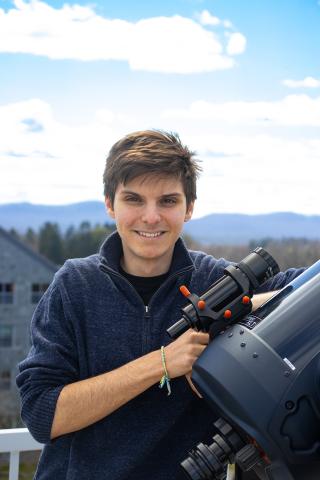
“What is the goal of education?” asks Alex DelFranco ’24. This question will guide him as he ventures through school systems in Finland, Germany and India during his 2024–25 Watson Fellowship.
“It’s a question that I would’ve answered confidently if you asked me five years ago,” he says. He used to assume, with “a little bit of wide-eyed idealism,” that education was primarily about stoking students’ excitement to learn and giving them the tools to do so. He still believes that’s one good answer, but he has grown “much more aware of the nuances and the many different answers.”
In some communities, for instance, schools might be focused on passing down cultural traditions and values. Or a student might view education mainly as a path toward a lucrative job that they will need to support their family.
The three countries on DelFranco’s itinerary each take distinct approaches to education. Finland’s school system, consistently ranked among the best in the world, invests enormous amounts of time and money into teacher training. “Germany’s economy is the powerhouse of Europe, and their education system is intimately connected with their financial strength,” DelFranco explains in his Watson application essay. “Furthermore, secondary schools are split into three academic ranges: Gymnasiums are the most competitive, preparing students for higher education, Realschulen focus on intermediate pupils with a range of outcomes, and the Hauptschulen lead students into vocational education and training.” And India’s educational landscape has been shaped variously by precolonial traditions, British colonization and major modern reforms—which have played out differently in small rural schools than in large urban districts.
DelFranco says he will aim to build trust in the schools and communities he visits so that he can gather the perspectives of teachers, students and parents: “I’m curious to sit and listen and have you tell me what you think is exciting, and works about your system and what doesn’t, what scares you or could be improved.”
Already, a range of his own experiences have begun to color DelFranco’s views on education. As a high schooler in New York City, he co-founded the nonprofit Pensos to inspire younger students with courses in codebreaking, entrepreneurship and more. At Amherst, he helped to launch the Education Studies Club, worked as a teaching assistant, and majored in physics and astronomy, winning a 2023 Goldwater Scholarship. He planned to complete an honors thesis with Assistant Professor of Astronomy Kate Follette and head toward a Ph.D. in astrophysics.
Perhaps surprisingly, however, it was applying for yet another national fellowship last year—making it to the finalist round for a Truman Scholarship to support his work with Pensos—that brought DelFranco’s academic interests and career aspirations into a new focus. “While I really do like science research, I just get a lot more excited about education,” he explained. “That really is where my heart has been for the last few years.”
And so, after a junior year abroad at Oxford University, DelFranco returned to Amherst to undertake a senior thesis that tackles both science and education. With Follette’s help, he is designing a framework for an interactive online astrophysics textbook and testing it with focus groups of first-year and sophomore physics majors. “I think science is such a fun, exciting, engaging topic—when it’s taught correctly.”
But what are the “correct” ways of teaching? What—to return to DelFranco’s central query—is education all about? Looking ahead to his Watson adventure, he knows, “My answers to these questions are definitely going to change one year from now.”